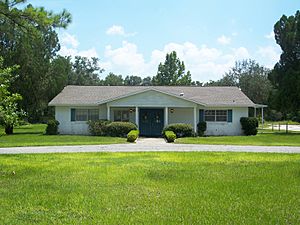Coleman, Florida facts for kids
Quick facts for kids
Coleman, Florida
|
|
|---|---|
| City of Coleman | |

Coleman City Hall
|
|

Location in Sumter County and the state of Florida
|
|
| Country | |
| State | |
| County | Sumter |
| Settled (Fort McClure) |
June 8, 1840 |
| Settled (Warm Springs) |
1853 |
| Incorporated (Town of Coleman) |
1882 |
| Incorporated (City of Coleman) |
June 20, 1908 |
| Government | |
| • Type | Mayor-Council |
| Area | |
| • Total | 2.24 sq mi (5.80 km2) |
| • Land | 2.24 sq mi (5.80 km2) |
| • Water | 0.00 sq mi (0.00 km2) |
| Elevation | 66 ft (20 m) |
| Population
(2020)
|
|
| • Total | 642 |
| • Density | 286.86/sq mi (110.74/km2) |
| Time zone | UTC-5 (Eastern (EST)) |
| • Summer (DST) | UTC-4 (EDT) |
| ZIP code |
33521
|
| Area code(s) | 352 |
| FIPS code | 12-13400 |
| GNIS feature ID | 0280642 |
Coleman is a city in Sumter County, Florida, United States. The population was 642 at the 2020 census.
Contents
History
Second Seminole War
On June 8, 1840, Colonel W. J. Worth, Colonel Bennet Riley, and the Second and Eighth Infantry divisions transferred to Fort McClure to search the Lake Panasoffkee area for Seminole warriors. Three days later, the troops discovered an empty village.
Modern town
By 1853, the "Fort McClure" community was renamed "Warm Springs".
In 1882, it was officially incorporated as a municipality and renamed the "Town of Coleman" after Dr. B.F. Coleman.
The main industries were citrus, cotton, and cattle. According to Broward Mill, the past president of the Sumter County Historical Society, Coleman became known for its cabbage production in the early part of the 20th century.
On June 20, 1908, the "City of Coleman" was officially reincorporated as a municipality.
In 1926, the West Palm Beach branch of the Seaboard Air Line began operations in Coleman.
In 1966, the American Automobile Association named Coleman the nation's biggest speed trap after the city's only police officer, Chief Ernest H. Barry, began lurking behind a billboard to catch speeding motorists. Barry arrested 369 motorists in just 5 months, all of them from out of town. In response, Governor W. Haydon Burns wrote a letter to Mayor J. F. Crawford, urging them to treat tourists as guests, after which Barry was fired.
In 1992, Southwest Florida Water Management District (SWFWMD) officials approved the purchase of 8.762 acres (3.546 ha) on the northeastern shores of Lake Panasoffkee near Coleman for the purchase of environmental preservation. SWFWMD officials sought to preserve over 300 species and neighboring Lake Panasoffkee. Although some residents applauded the move, others, such as Sumter County Commissioner Jim Allen, felt that the agency would prevent public use of the land.
Geography
The approximate coordinates for the City of Coleman is located at 28°48′01″N 82°04′08″W / 28.800331°N 82.068766°W.
According to the United States Census Bureau, the city has a total area of 1.5 square miles (3.9 km2), all land.
The city is in the South Central Florida Ridge section as defined by the United States Department of Agriculture. Most of Coleman's soils are sandy and moderately well drained or somewhat poorly drained. Topsoils are acidic, but subsoils may be alkaline with frequent presence of limestone boulders. A somewhat poorly drained, mildly alkaline sandy clay loam lies southeast of the built-up area.
Climate
The climate in this area is characterized by hot, humid summers and generally mild winters. According to the Köppen climate classification, the City of Coleman has a humid subtropical climate zone (Cfa).
Demographics
| Historical population | |||
|---|---|---|---|
| Census | Pop. | %± | |
| 1910 | 387 | — | |
| 1920 | 640 | 65.4% | |
| 1930 | 786 | 22.8% | |
| 1940 | 764 | −2.8% | |
| 1950 | 849 | 11.1% | |
| 1960 | 921 | 8.5% | |
| 1970 | 614 | −33.3% | |
| 1980 | 1,022 | 66.4% | |
| 1990 | 857 | −16.1% | |
| 2000 | 647 | −24.5% | |
| 2010 | 703 | 8.7% | |
| 2020 | 642 | −8.7% | |
| U.S. Decennial Census | |||
2010 and 2020 census
| Race | Pop 2010 | Pop 2020 | % 2010 | % 2020 |
|---|---|---|---|---|
| White (NH) | 396 | 341 | 56.33% | 53.12% |
| Black or African American (NH) | 263 | 213 | 37.41% | 33.18% |
| Native American or Alaska Native (NH) | 6 | 3 | 0.85% | 0.47% |
| Asian (NH) | 4 | 10 | 0.57% | 1.56% |
| Pacific Islander or Native Hawaiian (NH) | 0 | 0 | 0.00% | 0.00% |
| Some other race (NH) | 0 | 2 | 0.00% | 0.31% |
| Two or more races/Multiracial (NH) | 1 | 31 | 0.14% | 4.83% |
| Hispanic or Latino (any race) | 33 | 42 | 4.69% | 6.54% |
| Total | 703 | 642 |
As of the 2020 United States census, there were 642 people, 299 households, and 175 families residing in the city.
As of the 2010 United States census, there were 703 people, 261 households, and 144 families residing in the city.
See also
 In Spanish: Coleman (Florida) para niños
In Spanish: Coleman (Florida) para niños

